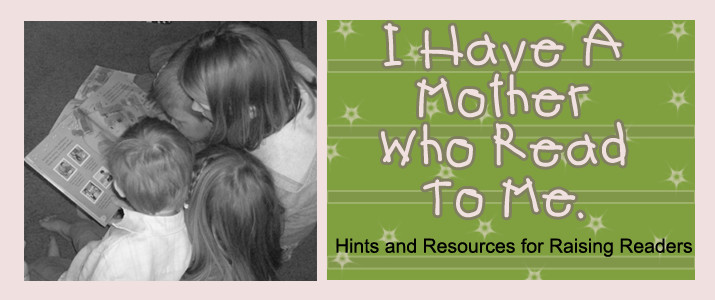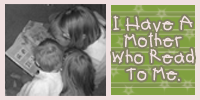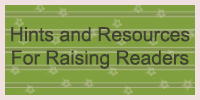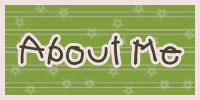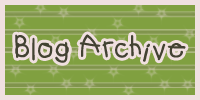 Many parents are sending their children back to school this week. And undoubtedly many kids will come home with leveled books to read as part of their homework each evening. This is wonderful because practice is so important.
Many parents are sending their children back to school this week. And undoubtedly many kids will come home with leveled books to read as part of their homework each evening. This is wonderful because practice is so important. Wednesday, August 19, 2009
Back to School
 Many parents are sending their children back to school this week. And undoubtedly many kids will come home with leveled books to read as part of their homework each evening. This is wonderful because practice is so important.
Many parents are sending their children back to school this week. And undoubtedly many kids will come home with leveled books to read as part of their homework each evening. This is wonderful because practice is so important. Sunday, August 2, 2009
Summer Reading
Like it or not, there is a HUGE achievement gap between rich, middle class, and poor kids. (Obviously, this isn't always every case and love of reading makes a huge difference in those instances, but statistically speaking it is true.) Mr. Trelease said that kindergarten teachers are miracle workers because although poor kids enter school a year behind academically, by the end of kindergarten they catch up. Sadly, though most of what they gain is lost over the summer.
WHY? Because they are not read to and/or required to read during the summer.
Eventually, by the time they reach fourth grade, the poor kids are two full grades behind in reading. And it is all due to reading loss over the summer.
You can see the startling chart on Mr. Trelease's website: http://www.trelease-on-reading.com/web-charts/summer-loss.pdf.
So READ, READ, READ to those kids for the next 3 weeks. If they can read themselves have them read to you! Because kids who read 20 min./day have been known to go up to 2 reading levels over the summer. If they seem like they've lost a little, that is fine... just start where they are now and work back up.
Summertime is not the time for a vacation from reading!
Monday, July 20, 2009
Let's Party!!

1. Being whisked away from the airport in a limo. Here are me, Bobbi, and up-up-upline supervisor Deb Casey in the limo.
3. JIM TRELEASE!!! Have you read the Read Aloud Handbook? It is amazing and will make you a better parent. He signed my copy.
4. Not having to think about, prepare, or clean up meals and having my bed made everyday.
5. The Hawaii Celebration luncheon, team parties, late night "Name Game" sessions, and being with my wonderful friends (some that I only see 1-2 times each year).
7. It is always fun to be recognized for your efforts. The awards I received were: Supervisor of the Year Honorable Mention, #3 Central Group Recruiting, #4 Group Promotions, #4 Personal Recruiting, #11 Central Group Sales, and #15 Home Show Sales.
8. Coming home to my family. The kids had cleaned up the house (in their way) and Katie had laid out my pjs and the stuff in the picture below. What great kids!!
Let's Get Jim Trelease on Oprah!
Please join a campaign to get the word out!! One of the best ways is through Oprah. A gal that moms listen too. Please click the link below and scroll down to the bottom. https://www.oprah.com/ord/plugform.jsp?plugId=216
I'll post more on Jim's information later.
Sunday, June 21, 2009
Dads
In honor of the day I just want to remind everyone about the importance of dads reading to their little ones. NUMEROUS studies have linked a father reading to their child with positive academic outcomes, bonding, etc. (These are studies that specifically focused on fathers.)
Reading aloud is NOT just a job for my moms!!! In fact, at my house we ALL prefer dad to be the reader. He makes such great voices. :)
Sunday, May 31, 2009
Freakonomics
You probably guessed that the last one had something to do with reading. You got it!
The number of books in the home was one of the top 5 factors in kids' later academic and professional achievement. The more books the family had, the more successful the kids were.
The authors didn't really hypothesize on why this is the case, they just presented the facts :), but my theory is that homes with lots books are homes were reading and learning are valued. The kids have so many good things available to read that they grow up thinking reading is fun. They learn so many fascinating things from their books that they think learning is fun too. They know their parents value reading and learning because there are lots of books in the house. Kids who think reading and learning are fun and know their parents believe it is important are bound to better in school.
So there is another reason to buy and read books for children from an unexpected, but interesting, source.
Sunday, May 17, 2009
Reading to Kids of Different Ages


Thursday, April 23, 2009
Happy Turn off the Television Week!

- Researchers at Seattle's Children Hospital studied 2,500 children and concluded that for each hour of daily TV viewing by children under three, increased the the risk of the child devloping attention deficit hyperactivity disorder (ADHD), which is the most common behavior disorder, by 10 percent!
- By age 6, 43% of all children have a television as a permanent fixture in their bedroom. By age 8, 60% of children have a TV in their bedroom. More on TVs in the bedroom later
- "In homes with children age 6 and younger the TV in on at least 50% of the time."
- Long-term studies (like a twenty-six year study published in 2005) show a negative impact on the hours viewing the TV to academic achievement and level of education achieved. Even when researchers controlled for IQ, socioeconomic status, and behavioral problems, how much TV kids watched directly related to how much education they achieved. Forty percent of children who watched less than 1 hour/day earned a bachelor's degree, while only 10% of children that watched 3 hours/day did. The American Academy of Pediatrics recommends 2 hours or less of TV each day. Only 19% of kids who watched 2-3 hours of TV earned a bachelor's degree.
Okay, back to TV in the bedroom. Kid's who have a TV in their bedroom (regardless of ethnicity) have lower math, reading, and language arts scores. (Experts found an average of 10 point difference in math scores and 9 points in reading among kids who did and did not have TVs in their bedroom.) Experts believe this is because they watch more TV than kids who don't. Sleep researches have also found that kids with TVs in their bedroom have more difficulty falling asleep and wake more frequently at night. Thus, they are more likely to be sleepy at school.
Is there a safe level of TV viewing? A very large international study found some positive and no negative effects on learning in kids who watched 1-10 hours of TV/week. After that however, scores declined. Sadly, the average American child is watching 28 hours of TV/week instead of playing, reading or being read to, using their imagination, being creative, using their hands, developing relationships, and other things important for healthy child development.
Clearly, as parents and grandparents we need to be vigilent about monitoring children's TV viewing. Which will be the subject of another post.
By the way, since we've turned off the TV (which at our house means no DVDs) this week, homework has been done earlier, we've gone to the park, we've had more time for bedtime baths, the kids have spent a lot of time riding their bikes, we've played games, there has been more time for chores, there has been less snacking. It has been a productive week!
Friday, March 27, 2009
Be Back Soon!
In the meantime, this blog is getting a facelift by Tiffini at www.that-blog-place.com.
Happy Reading!
Playing Games with Books

- Rhyming. Example: "Hmmm... Fox Lox. Those rhyme! They end the same. What else rhymes with goose... how about socks. Can you think of one?"
- Letter spotting. Example: "See this line with a dot on top... that is the letter 'i.' Can you find another 'i.' Here's one! Let's count all the 'i's on this page."
- Comprehension games. Example: "What do you think is going to happen next?"
- Empathy building. "Oh... look at that little girl's face. I think she is sad, happy, surprised, etc." OR "How do you think she is feeling? Why do you think she feels like that? Let's read and see if we can find out."
- Silly games. Example: When reading a book about trucks... "Once upon a time there was a beautiful princess."
While the story is important to your child following a fun (and/or educational) tangent can actually enhance reading time. This works especially well with familiar favorites.
If you have any fun games, traditions, or ideas please share by posting a comment.
Monday, February 23, 2009
1000 Stories

Wednesday, February 4, 2009
Nursery Rhymes and the 3 "Rs"
- Rhyme
- Rhythm
- Repition
Those "Rs" lay the foundation for a child to be able to learn phonics. If you have a new baby, a toddler or preschooler, or even a kindergartner or first grader NOW is the time to teach your child some nursery rhymes.
I'll share more on nursery rhymes later.
Saturday, January 24, 2009
Reading and the Youngest of Kids
- Have frequent one-on-one conversations with your baby.
- Talk to your baby during necessary routines like diaper changes, baths, etc.
- Listen to your baby's sounds and repeat the sounds back to them.
- Read board, cloth or vinyl books you baby cold help hold.
- Point to pictures and name familiar objects while you look at books.
- Sing often to your baby.
- Say nursery rhymes to spark your baby's awareness of language and sounds.
Why Read to An Infant?
- It builds a positive association with books. People (even babies) are hedonistic we like activities that bring us pleasure. Cuddling with a loved adult, listening to their voice is something babies love... and if they associate that time with books they will learn to love reading.
- Baby's learn MANY new vocabulary words from books. The typical children's story book has more unique vocabulary words than a conversation among PhDs. (source: Dr. Robert Titzer) Books that have familiar objects that you can point to and name are really great for young babies.
Helpful Hints for Reading to Infant?
- Choose a time when they are happy and relaxed. Not right before a feeding when they may be getting cranky.
- Follow their cues. If they are done before the book is over that is fine.
- It's okay to read the same story over and over. Repetition is SO good for babies!
- Look for books with black and white and bright colors for babies. They also enjoy textures.

- Look for books few words/page.
- Look for books with lots of repeated words or phrases.
So cuddle up with that little one and read!!
Friday, January 23, 2009
Why I Started This Blog
What a great gift they are giving those children!! They understand what Abraham Lincoln meant when he said, "A capacity and taste for reading gives access to whatever has already been discovered by others." Or, as Dr. Seuss so eloquently put it, "The more you read, the more things you will know. The more that you learn, the more places you'll go."
However, I meet other people and I am often surprised by their misinformation and attitude towards books. For example, I can't tell you how many times I've been told (usually by a dad or a grandma, sometimes by a mom) "Oh, he is only six months old. He's too young for books." Guess what... he was ready to be introduced to books six months ago.
If you have a topic you'd like me to research or any information you'd like to share, please let me know. Thank you for reading.
